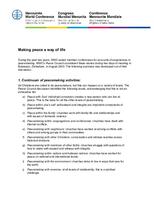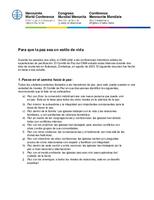Posted: October 16, 2020 | Category: Resource Document
- Resource Document
During the past two years, MWC asked member conferences for accounts of experiences in peacemaking. MWC’s Peace Council considered these stories during two days of meeting in Bulawayo, Zimbabwe, in August 2003. The following summary was developed out of that discussion.
1. Continuum of peacemaking activities:
All Christians are called to be peacemakers, but this can happen on a variety of levels. The Peace Council discussion identified the following levels, acknowledging that this is not an exhaustive list:
a. Peace with God: individual con-version creates a new person who can live at peace. This is the base for all the other levels of peacemaking.
b. Peace within one’s self: self-esteem and integrity are important components of peacemaking.
c. Peace within the family: churches work with family life and relationships and with issues of domestic violence.
d. Peacemaking within congregations and conferences: churches have dealt with internal conflicts.
e. Peacemaking with neighbours: churches have worked at solving conflicts with others and among groups in their communities.
f. Peacemaking with other Christians: conversation and witness reaches across historical divisions.
g. Peacemaking with members of other faiths: churches struggle with questions of how to relate with respect and witness with integrity.
h. Peacemaking within nations and between nations: churches have worked for peace on national and international levels.
i. Peacemaking with the environment: churches strive to live in ways that care for the earth.
j. Peacemaking with enemies: at all levels of relationship, this is a spiritual challenge.
2. Biblical virtues that undergird peacemaking:
The peacemaking activities of churches grow out of their reading of the Bible. A number of biblical virtues serve as a basis for peacemaking:
- liberty
- self-esteem
- love
- repentance
- corporate-ness
- suffering (including patience, forbearance, and endurance)
- reconciliation (which includes restoration)
- justice and peace held together
- confrontation of injustice
- joy
- courage
- humility
- forgiveness
- witnessing
3. Practices that form Christians as peacemakers:
Peace Council participants noted these practices that instill peacemaking as a habitual practice for Christians:
a. Catechizing and discipling: the Christians’ identity as peacemakers is imparted in the way churches teach and receive new members.
b. Worship: peacemaking identity and habits are instilled in the way congregations worship God.
c. Prayer: peacemaking habits are engendered by prayer and the spiritual disciplines. Witness to the powers can also be considered as prayer.
d. Christian education: this shapes peacemakers; Christian education should include specific training for all ages, including church leadership, in peacemaking skills.
e. Voluntary service: these activities can help young Christians learn peacemaking as they do it.
f. Global awareness: this expands understanding of those beyond our boundaries; global awareness should include awareness of inter-ethnic and inter-faith differences.
g. Non-violent action: advocacy to those in power and actions that confront injustice help Christians develop peacemaking skills.
4. Recommendations to MWC:
The Peace Council participants encouraged MWC to continue making peace a central part of conversation between member churches. To help this happen, the council made these recommendations:
a. MWC should encourage all member churches to find ways to cooperate with other Christian churches and groups in their contexts in peacemaking efforts, with special attention to activities of churches in the United Nations’ Decade to Overcome Violence.
b. MWC should designate one Sunday each year as a global peace Sunday, encouraging member churches to hold special worship services around, similar to what is now done for the World Fellowship Sunday. Suggested worship materials should be provided for this day.
c. The next MWC world assembly should have one day or one worship service with a theme of peace. This could include sharing stories from around the world of ways in which churches are working for peace.
Courier, Volume 19, volume 3, 2004




Join the Conversation on Social Media
FacebookTwitterInstagramFlickrYouTube